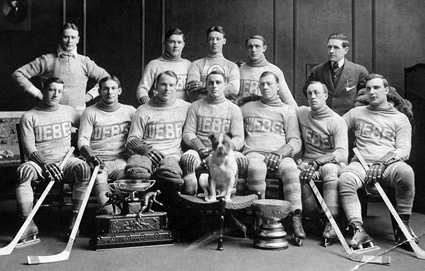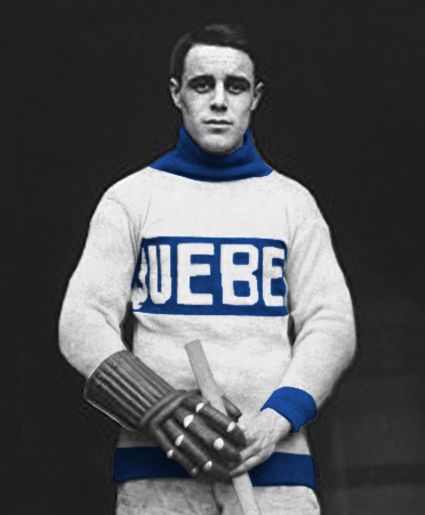Joe Malone got his season, and the brand new National Hockey League (NHL), off with a bang when, on the day of the first games in league history, he scored five goals in the Montreal Canadiens 7-4 win over the Ottawa Senators on December 19, 1917.
Known as "Phantom" Joe Malone because of his ability to seemingly get by opposing defensmen undetected, Malone continued to excel in during the inaugural NHL season, scoring a goal in 14 consecutive games, which still stands to this day as the second longest goal scoring streak in NHL history. Malone would wind up leading the league in scoring that season with 44 goals in what was then just a 20 game schedule.
Malone originally played for the Quebec Bulldogs in the final year of the Eastern Canada Hockey Association (ECHA) in 1909 and, giving a hint of what was to come, scored eight goals in 12 games.
The Bulldogs would move a new league, the Canadian Hockey Association, which would fold almost immediately, forcing Malone to play a season for Waterloo of the Ontario Professional Hockey League.
Back with the Bulldogs, who had now joined the National Hockey Association (NHA) for the 1910-11 season, Malone would score 9 goals in 13 games, followed by 21 goals in 18 games in 1911-12, leading the Bulldogs to the NHA championship, earning them the right to hold the Stanley Cup. The Bulldogs would face one challenge for the cup that season from the Moncton Victorias. Malone would score five goals in the two games the Bulldogs required to successfully defend the cup.
1912-13 would see a 43 goal explosion from Malone in a 20 game season as Quebec again finished atop the standings to retain the Stanley Cup. The Sydney Millionaires would challenge the Bulldogs for the the cup, but, behind Malone's nine goals in Game 1 alone, the Bulldogs would easily disptach Sydney by a score of 20-5 in the two-games, total-goals series.
The 1912-13 Bulldogs with the O'Brien Cup, as NHA champions, and
the Stanely Cup, as the best team in Canada.
After four more seasons with Quebec in the NHA, the majority of the club owners in the NHA elected to suspend league operations and form a new league, the NHL, in order to distance themselves from unwanted owner Eddie Livingstone. The Bulldogs were invited to participate in the new league but, facing financial difficulties, suspended operations for two seasons. As a result, their players were distributed among the other remaining clubs, and Malone was claimed by the Montreal Canadiens for the 1917-18 season.
Paired with future Hall of Famers Newsy Lalonde and Didier Pitre, Malone would shift to left wing and lead the league in scoring, with 48 points, and goals, with 44 in 20 games. His 44 goals set a single season record that would stand for 27 years until finally surpassed by Maurice Richard during a 50 game season in 1945. When Richard scored his 45th goal to set the new record, Malone was present to congratulate Richard and present him with the record-breaking puck.
In addition to his five goal game on opening night, Malone would repeat the feat twice more during the season and remains the only person to have scored five goals in a game more than once during a single season, let alone three times.
His second season with the Canadiens was limited due to Malone landing a better paying job in Quebec City. Including the playoffs, he would only play 13 games that season, which saw him score 12 times.
With the Quebec Bulldogs franchise revived for the 1919-20 season, Malone returned to Quebec, now renamed the Athletics although many still referred to them as the more familiar Bulldogs. He led the league with 39 goals (89% of the team's 44 goal total for the entire season!) in 24 games, which included his NHL record setting seven goals on this date in 1920 in a game versus the Toronto St. Patrick's, a record which still stands today.
Malone started off the game with his first goal at the 6:50 mark of the first period followed by Reg Noble evening the score at 1-1 with a goal at the halfway mark of the period. Quebec then added a pair of goals at 15:25 and 16:05 before Toronto responded with their second goal at 17:10 as the first period ended with the score at 3-2 for Quebec and Malone having scored just once, giving little indication of what was to follow...
Same has he did in the first period, Malone scored the first goal of the second, needing just 55 seconds to beat Mike Mitchell for the second time. Corb Denneny responded with a St. Patricks goal four minutes later, but Malone completed his hat trick at 10:18 to restore the Bulldogs two goal margin. Noble scored again for Toronto at 13:58 but Malone's fourth goal of the game and third of the period came at 18:18 for a 6-4 Quebec lead after two periods.
Howard Lockhart replaced Mitchell in goal for Toronto, who pulled back to within one yet again when Mickey Roach scored at 2:40. Quebec replied yet again at 4:10 only to have the St. Patricks Cully Wilson score just 30 seconds later to make the score 7-6 for Quebec. Lockhart had managed to keep the red hot Malone off the scoreboard for the first half of the third period, but at exact the 10 minute mark, Malone scored his fifth goal of the night which was followed by completing his second hat trick with his sixth goal just two minutes later. With just 45 seconds left in the game, Malone entered the NHL record books with his seventh goal of the night at third of the period against Lockhart for a final score of 10-6. During the game, Malone actually had an eighth goal negated by an offside call.
Malone also had a six goal night to close out the schedule on March 10th and finished the season with ten assists to lead the NHL in scoring with 49 points.
Unfortunately, the Athletics were a horrible defensive team and gave up an average of over seven goals a game, including an NHL record 16 allowed against Montreal that still stands today, something not even the scoring exploits of the prolific Malone could overcome. With Quebec finishing last in the league with matching 2-10 records in both halves of the season, the struggling team was then sold to an ownership group who relocated the franchise to Hamilton, Ontario and renamed them the Tigers. Malone managed to finish fourth in league scoring while putting up seasons of 28 goals in 20 games in 1920-21 and 24 goals in 24 games the following year despite the Tigers being anchored to the bottom of the standings both seasons.
Malone was traded to the Montreal Canadiens for the 1922-23 season, but scored but a single goal in 20 games in a backup role. He played 10 games the following season without scoring before retiring on January 23, 1924.
In 15 seasons throughout various leagues, Malone scored 343 goals in 275 games and was inducted into the Hockey Hall of Fame in 1950.
Today's featured jersey is a 1912-13 Quebec Bulldogs Joe Malone jersey. from the Bulldogs back to back NHA championships, which also included a pair of successful defenses of the Stanley Cup. They originally wore the horizontally striped jerseys shown in the hockey card above, followed by a jersey with a large "Q" on the front. If you look closely at the team photo above, that style jersey is being worn by the player in the center of the back row, although it is rather obscured.
The Bulldogs then changed to today's featured jersey with "QUEBEC" boldly emblazoned across the front, which was worn during their greatest successes in 1912 and 1913.
Today's video is a look back at the history of the Quebec Bulldogs.
















Do you know what number he wore or Quebecs goalie Paddy Morane?
ReplyDeleteScottie J
Wow. Tough question. We have no idea. You can find player stats that date back to the pre-NHL days, but rarely, if ever, can you find rosters with player numbers. This one will be especially difficult since Moran never played in the NHL and it's hard enough to find jersey numbers before the 1950's. I'd try the Society For International Hockey Research and see what they might know.
ReplyDelete